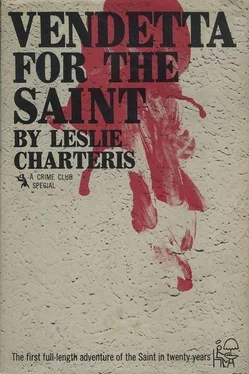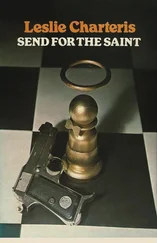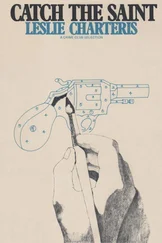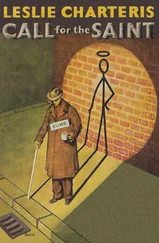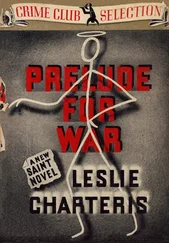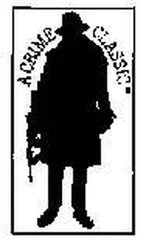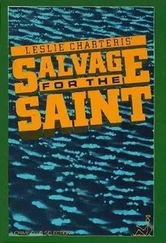Leslie Charteris - Vendetta for the Saint
Здесь есть возможность читать онлайн «Leslie Charteris - Vendetta for the Saint» весь текст электронной книги совершенно бесплатно (целиком полную версию без сокращений). В некоторых случаях можно слушать аудио, скачать через торрент в формате fb2 и присутствует краткое содержание. Город: Garden City, New York, Год выпуска: 1964, Издательство: Crime Club by Doubleday, Жанр: Крутой детектив, на английском языке. Описание произведения, (предисловие) а так же отзывы посетителей доступны на портале библиотеки ЛибКат.
- Название:Vendetta for the Saint
- Автор:
- Издательство:Crime Club by Doubleday
- Жанр:
- Год:1964
- Город:Garden City, New York
- ISBN:нет данных
- Рейтинг книги:5 / 5. Голосов: 1
-
Избранное:Добавить в избранное
- Отзывы:
-
Ваша оценка:
- 100
- 1
- 2
- 3
- 4
- 5
Vendetta for the Saint: краткое содержание, описание и аннотация
Предлагаем к чтению аннотацию, описание, краткое содержание или предисловие (зависит от того, что написал сам автор книги «Vendetta for the Saint»). Если вы не нашли необходимую информацию о книге — напишите в комментариях, мы постараемся отыскать её.
From then on, except for an interlude with a luscious Italian pasta named Gina, it was all-out, heel-stomping war, with the Robin Hood of Modern Crime pitted against the arch-evil, centuries-old traditions of the Mafia!
Vendetta for the Saint — читать онлайн бесплатно полную книгу (весь текст) целиком
Ниже представлен текст книги, разбитый по страницам. Система сохранения места последней прочитанной страницы, позволяет с удобством читать онлайн бесплатно книгу «Vendetta for the Saint», без необходимости каждый раз заново искать на чём Вы остановились. Поставьте закладку, и сможете в любой момент перейти на страницу, на которой закончили чтение.
Интервал:
Закладка:
Once inside that ancient building, the recording and annotating of the fracas proceeded with ponderous solemnity. There was an incredible amount of laborious writing on multiple forms, and the continual thumping of rubber stamps accompanied it like a symbolic drum-roll of bureaucracy. The only ripple in the remorseless impersonality of the routine occurred when the Saint presented his passport for examination, and raised eyebrows and knowing glances informed him that his reputation was not entirely unknown even there.
When the knife-wielding citizen was brought in, Simon saw that his injuries had been partly patched up by a police sugeon: one splinted arm hung in a sling, and a large wad of gauze was taped over his nose. From behind the edges of it, a pair of bloodshot eyes glared hatred at the Saint, who responded with a beatific smile.
With the preliminary recordings completed, another door opened and the maresciallo del carabinieri made his impressive entrance.
His elaborately decorated and braided jacket and cap, worn even in the heat of the office, left no doubt of the eminence of his rank. His head was nobly Roman and graying at the temples, not unlike the average man’s mental picture of a Caesar; though the softness of the lower lip suggested Nero rather than Julius.
He stared coldly down the straight length of his nose at Simon; then swivelled his eyes, like the black orifices of cannons coming to bear, towards the bandaged knife-wielder.
“Well, Tonio,” he said stolidly, “you were not out of trouble very long this time.”
“I did nothing, maresciallo, nothing! I swear on my mother’s tomb. It was this fannullone” — the man called Tonio jerked the thumb of his good hand towards Simon — “who caused the trouble. He is a madman, perhaps. He comes up to me on the street, insults me, pulls out a knife. I had done nothing!”
The maresciallo glanced through the papers which had been written up, and turned his imperial gaze on Simon.
“What have you to say about this?”
“Nothing — except that Tonio must have very little respect for his mother,” said the Saint calmly. “There were a dozen people around when he attacked me with the knife. They all saw me disarm him. Some of them may also have noticed his accomplice waiting near by in a car, who left rather hurriedly when Tonio was detained. If that is not enough, ask him how my coat was cut if I was trying to stab him, or why I did not use the knife on him instead of my hands. After that, you might ask him who hired him to kill me.”
The maresciallo heard the words with pursed lips and mask-like impassibility. He poked at Simon’s passport on the desk before him.
“We do not like international criminals who pose as simple tourists,” he said. “Who come here and attack people.”
Simon Templar’s eyes widened for an instant as he took the shock. Then they narrowed into chips of blue ice as cold as the edge that crept into his voice.
“Are you suggesting that there is one grain of truth in that creature’s story, or that there is one shred of evidence to support it?”
Under the pressure of the challenge the maresciallo’s imperial manner slipped a bit. He squirmed inside his gorgeous jacket and seemed to find it a relief to switch his gaze to Tonio at frequent intervals.
“That is not the point. I mean to say, this is an investigation, and we must consider all possibilities. There is some doubt among the witnesses as to exactly what happened. And you must admit, Signor Templar, that your reputation is not spotless.”
Simon glanced around at the carabinieri, who stared stolidly back, registering neither approval nor disapproval of their officer’s attitude. The Saint had never cherished any childlike faith in the impartiality of the police, but he did not have to be excessively cynical to realize that there was something more here than a normal suspiciousness of his honesty and respectable intentions. And an insubstantial but chilling draught seemed to touch his spine as it dawned on him that something more dangerous to him than any knifeman’s blade might lie beneath the surface of that impersonal hostility.
Then yet another man came in, in ordinary clothes but with a subtle air of authority that invisibly outranked the maresciallo’s gold-encrusted magnificence, and the tension that had begun to build up dissolved as if it had all been an illusion.
He was a man of medium build, flat-bellied, with the gray eyes and curly blond hair that are native only to northern Italy. His browned features seemed almost boyish at first, until one discovered the intermingled lines etched among them by twenty years more than was suggested by their youthful contours. But he walked with an athletic spring in his step which again belied those skin-deep foreshadowings of middle age.
He stopped in front of Tonio, studying him carefully, and said: “I am glad to see someone has worked on your ugly face, piece of filth.”
He added some more vivid epithets which would have invited a duel to the death in any tavern in Sicily, but the wounded Tonio only glowered and kept his lips buttoned.
No one else spoke either as the newcomer turned to the maresciallo’s desk and flicked through the papers on it.
“Simon Templar!” he said, looking up and laughing. “We seem to have landed a big one this time.”
He came towards Simon and offered his hand.
“Let me introduce myself, Signor Saint: my name is Marco Ponti. I am the agente investigativo here, what you would call a police detective. Now you know all about me, because I am sure you know all about detectives. But I also know something about you. And since you are here, it is my business to ask what brings you to Sicily?”
“Only the same attractions that bring thousands of other tourists here,” answered the Saint, relaxing guardedly. “Which of course did not include having one of your problem paisani try to knife me.”
“Ah, poor Italy — and poorer Sicily! Many are in want here and turn to crime to fill their stomachs. Though of course that is no excuse. Be assured that justice will be done. We ask you only to be available to support your charges.”
“With pleasure. But there seems to be some difficulty.”
“Difficulty?” Ponti’s eyebrows lifted elaborately. He turned back to the desk and riffled through the papers again. “Everything looks in order to me — is that not right, maresciallo?”
The officer shrugged.
“No difficulties. I was only asking a few questions.”
“Ebbene! Then I suggest that you, Signor Templar, give us the name of your hotel — but you have already done that, I see in your statement. That is all we need for now. We will notify you when the case appears before the giudice instruttore, the magistrate. Unless the maresciallo has anything more to ask?”
The maresciallo could not have lost interest more completely. A gesture that combined a shrug, a small throwing-away motion of the hands, and a regal tilt of the head, conveyed that he was finished, bored, and only wished to be spared further tedium.
“And you, Signor Templar, have nothing more to say here?”
Ponti’s eyes looked directly into the Saint’s, and for an instant the engaging boyishness no longer seemed to be the dominant characteristic of his face. Instead, there was only an intense and urgent seriousness. As clearly as if the lines in his forehead had spelt it out in capital letters, it changed his words, for Simon’s reception only, from a question to a command.
“Nothing more,” said the Saint steadily.
His acceptance of the silent order was instinctive. Whatever had been going wrong before, Ponti’s arrival had temporarily diverted it, and Simon Templar was not one to scorn a lifeboat until unfathomed waters closed over his head. Besides which, he sensed an essential difference between Ponti’s implied warning and the kind that had menaced him a little earlier. But the questions which it raised would have to wait. For the present, the opportunity to leave the police station was satisfaction enough. He was already suffering some of the feeling of claustrophobia which was inclined to afflict him in places that had a direct connection with prisons.
Читать дальшеИнтервал:
Закладка:
Похожие книги на «Vendetta for the Saint»
Представляем Вашему вниманию похожие книги на «Vendetta for the Saint» списком для выбора. Мы отобрали схожую по названию и смыслу литературу в надежде предоставить читателям больше вариантов отыскать новые, интересные, ещё непрочитанные произведения.
Обсуждение, отзывы о книге «Vendetta for the Saint» и просто собственные мнения читателей. Оставьте ваши комментарии, напишите, что Вы думаете о произведении, его смысле или главных героях. Укажите что конкретно понравилось, а что нет, и почему Вы так считаете.
